FIFA Demands Iran’s Explanation Over Banning Women From Stadium
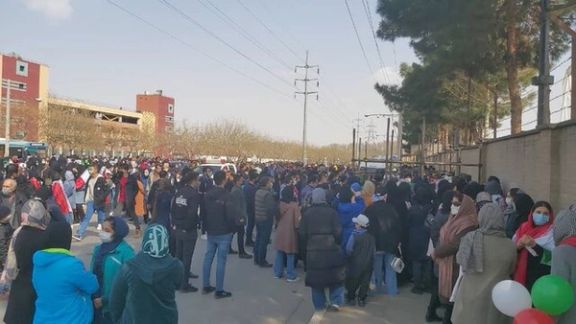
FIFA has asked Iran to explain the incidents surrounding a match in March in the city of Mashhad where women who wanted to watch the game were pepper sprayed.

FIFA has asked Iran to explain the incidents surrounding a match in March in the city of Mashhad where women who wanted to watch the game were pepper sprayed.
The Disciplinary Committee of the international governing body of association football – or soccer -- sent a letter to the Iranian Football Federation on Tuesday, and gave it a week to provide a response about the events at the FIFA World Cup qualifier between Iran and Lebanon on March 29, during which security forces denied women entry into the stadium and used tear gas and pepper spray to disperse them.
The letter stated five cases of violations of the body’s codes and regulations, adding that investigations are in progress about the incidents.
About 12,500 tickets were sold for the match, and 2,000 of them were allocated for women, but hundreds of women with tickets were not allowed into the Imam Reza stadium in the religious city of Mashhad.
Mashhad is home to numerous hardliner clerics who are against the presence of women in male dominated places. Firebrand representative of the Supreme Leader in the city, Ayatollah Ahmad Alamolhoda has been banning concerts and cultural events for years. The forceful banning of women’s entry into the stadium was reportedly ordered by the local clergy.
The world’s soccer authority had tried to convince Iran’s government -- which has barred female spectators from stadiums for years claiming it would violate religious rules of decency -- to lift the unwritten ban for nearly a decade. The ban has led to many arrests, beatings, detentions, and abuses against women.

An Iranian official says according to the available data about 95 percent of abortions in the country are carried out through "illegal" procedures.
Saleh Ghasemi, head of the Center for Strategic Research on Population, said on Thursday that abortion is one of the most effective variables in population growth, adding that "Only three percent of abortions [in Iran] are legal, and two percent of abortions are spontaneous."
He also said that only four percent of abortions happen due to what he called "illegitimate relations".
The ban on abortion in Iran has made women go to underground and often unsanitary centers to terminate their pregnancies. Unsanitary abortion has caused the death of many women and sometimes it has caused lifetime complications.
Earlier in the year, Iran’s Supreme Leader Ali Khamenei said efforts to increase the country's population are among the most urgent duties and essential policies of the Islamic Republic.
Parliament has passed legislation to outlaw tubectomy, vasectomy, and the free dispensation of contraceptives other than where pregnancy would threaten a woman's health. The health ministry has advised women over 35 to wait only a year before becoming pregnant again and under-35s to wait six months.
Medical experts have warned that the new legislation would increase sexually transmitted diseases by restricting access to condoms.
The law obliges the government to offer incentives, including a 7.5-fold increase in child-benefit payments to government employees, interest-free loans, and other benefits. While the new law does not include a ban on prenatal screening, doctors have been advised not to encourage it.
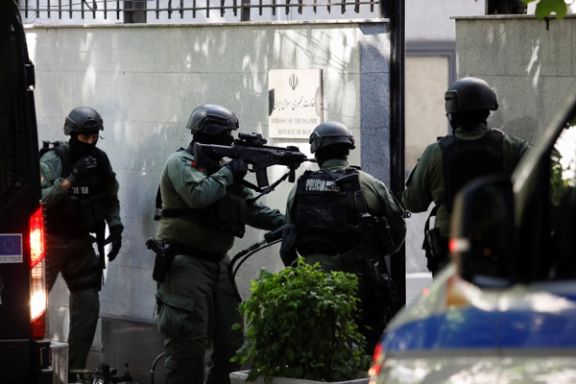
Iran’s foreign ministry Thursday rejected US and UK accusations about an Iran-linked cyberattack against Albania, which cut diplomatic relations on Wednesday.
Albanian counter-terrorism police searched the empty Iranian embassy in Tirana on Thursday, hours after Iranian diplomats burned papers inside the premises following the severing of diplomatic ties over a cyberattack.
“The US and the UK that had previously remained silent in numerous cyberattacks against the Islamic Republic of Iran’s infrastructures, and even against its nuclear facilities, and had directly or indirectly supported those measures, lack any legitimacy to level such accusations against the Islamic Republic of Iran,” spokesman Nasser Kanaani said in a statement.
Kanaani also warned against “any political adventurism against Iran with such ridiculous excuses” and expressed Iran’s “complete readiness to deal with any possible conspiracy decisively and immediately that would make them feel regretful.”
Albania severed its relations with Iran on Wednesday and ordered all Iranian diplomats and embassy staff to leave the country within 24 hours.
"The government has decided with immediate effect to end diplomatic relations with the Islamic Republic of Iran," Albanian Prime Minister Edi Rama said in a rare video address on Wednesday following an investigation into an alleged Iranian cyberattack in July which temporarily shut down numerous Albanian government digital services and websites.

"This extreme response...is fully proportionate to the gravity and risk of the cyberattack that threatened to paralyze public services, erase digital systems and hack into state records, steal government intranet electronic communication and stir chaos and insecurity in the country," he said.
The White House National Security Council hours later strongly condemned the cyberattack against its NATO ally Albania in a statement, saying it will “take further action to hold Iran accountable for actions that threaten the security of a US ally and set a troubling precedent for cyberspace.”
The new UK Foreign Minister James Cleverly also said in a statement Wednesday that “Iran’s reckless actions showed a blatant disregard for the Albanian people, severely restricting their ability to access essential public services,” adding that the UK joinsAlbania and other allies in “exposing Iran’s unacceptable actions.”
US Senator Jim Risch (R-Idaho), ranking member of the Senate Foreign Relations Committee also condemned Iran’s alleged cyberattack against Albania. “Iran must be held accountable for its malicious attacks, and I support Albania's decision to sever diplomatic ties. The US will continue to support Albania,” Risch tweeted Wednesday evening.
The alleged attack took place during a conference of the exiled Iranian Albania-based opposition group Mujahideen-e Khalq (MEK) in mid-July.
In an August 5 report, US cybersecurity firm Mandiant expressed “moderate confidence” the attackers were acting in support of Tehran’s efforts to disrupt the MEK conference, which had to be cancelled as well due to a terror threat.
The Mandiant report said several factors indicated that the attack had been carried out by pro-Iran hackers, including the timing, the content of a social media channel used to claim responsibility, and similarities in software code used with malware long used to target Farsi and Arabic speakers.
After Saddam’s fall in 2003, MEK members stationed in Iraq were moved to Camp Ashraf north of Baghdad, which had been established in 1986 during the Iran-Iraq war. In 2016, the MEK was transferred by the US to a new compound in Albania, where it is active on social media.
In July, Iran's Foreign Ministry sanctioned a group of US officials and lawmakers over their alleged support for the MEK group, that Tehran considers a terrorist organization.
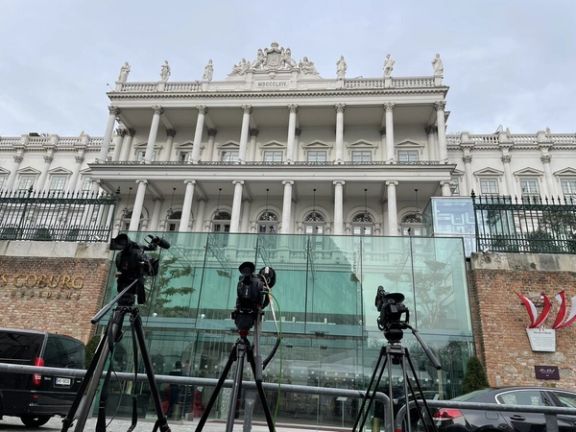
As a US Democratic Senator told Iran International that not reaching a nuclear deal with Tehran can be cataclysmic for the US and the Mideast, Republicans disagreed.
US Senator Chris Murphy (D-CT) told our correspondent on Wednesday that “I think there is still a very good chance that we'll get a deal. We are closer than we ever have been before, and the consequences of not reaching a deal are cataclysmic for the US and the Middle East."
About the Israeli efforts to dissuade the US from an agreement with Iran, he said “I'm in constant touch with Israeli embassy. I saw the ambassador before the August break. I disagree with Israeli government's position, but I'm always ready to listen.”
Senator Tommy Tuberville (R-AL) said that “Unfortunately there's always a chance (for a deal with Iran) with the Biden administration. We're totally against it as Republicans, we feel for all the people in the Mideast.”
"I think the only thing they're trying to do is to figure out a way to get Iranian oil to Europe, and if that's the reason, we don't need to be doing it, because it'd put a lot of people in harm's way if Iran gets that nuclear weapon. I don't understand what they're trying to do. But let's wait and see. I hope they continue to have problems with talks to get any kind of deal with Iran," he added.
Ben Cardin (D-MD) told Iran International that “There's some conflicting provisions that have to be resolved before an agreement can take place.”
Iranian political analysts say Tehran's nuclear talks with the United States are likely to be prolonged even until after US elections in November.

Lebanon is preparing to send a delegation to Iran for talks on acquiring “free fuel” to ease its power outages, without being exposed to US sanctions.
Two Lebanese government sources said on Wednesday that Iran's ambassador in Beirut, Mojtaba Amani, has proposed an Iranian "gift" of fuel to Lebanon.
If a deal is reached between Tehran and Beirut, the fuel deliveries would be Iran's first directly to the country after it previously sent some to its ally Hezbollah, a powerful armed group that is part of Lebanon's coalition government.
Lebanon has been struggling with outages for decades but its economic meltdown since 2019 has drained state reserves and slowed down imports of fuel for government plants, leaving most of the country with just one or two hours of state-provided electricity per day. The outages have forced households to rely on subscriptions to private generators that have skyrocketed as global fuel prices spiked.
Lebanon has natural gas fields in the Mediterranean Sea but a boundary dispute with Israel has so far prevented gas extraction that could help its economy.
The delivery of free fuel to another country is a sensitive issue in Iran where an economic crisis has impoverished millions of people, while the government has failed to reach a nuclear deal with the West, which could end economic sanctions imposed by the United States since 2018.
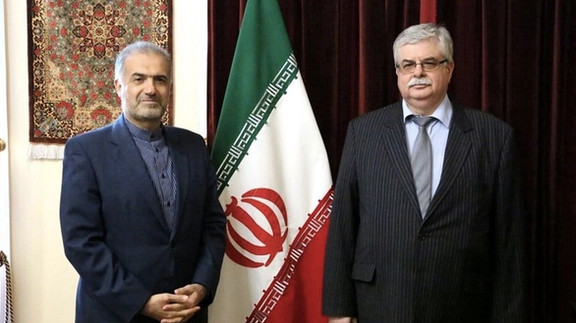
Iran's envoy in Moscow announced Tuesday that he met with Alexey Dedov, the new Russian ambassador to Tehran, who is replacing the former controversial envoy.
“I met with Alexey Dedov today. He will soon start working as Russia's new ambassador in Iran. We both stressed that relations between Iran and Russia currently stand at one of the best eras of their history,” Kazem Jalali tweeted. Jalali also wished success for Dedov and thanked the outgoing envoy Levan Dzhagaryan's (Jagarian) “efforts”.
The 61-year-old Alexey Yurievich Dedov began his career in the Soviet foreign ministry and served as the deputy head of mission of the Russian embassy in Iran from 2004 until 2009. He was posted to Islamabad, Pakistan, as ambassador in 2013. In February 2014 Dedov was promoted to ambassador extraordinary and plenipotentiary and until 2019 remained in Pakistan where he often wrote articles for Pakistan’s The Express Tribune.
The incumbent Dzhagaryan has served in Tehran since October 2011. In the past few months. Dzhagaryan has angered Iranian media and social media users on several occasions and made headlines for all the wrong reasons.
It is not clear if he was replaced for this reason or for Russia’s growing ties with Iran after the Ukraine invasion.
Anti-Russian sentiments have been quite often in Iran in the past few months, particularly since early March when Russia demanded exemption from the United States regarding Ukraine sanctions in all its dealings with Iran during talks to restore the 2015 nuclear deal (JCPOA). Iranian media and the public expressed outrage at Russia’s demand, seeing it as a hurdle in the way of concluding a deal that would lift US sanctions on Iran.
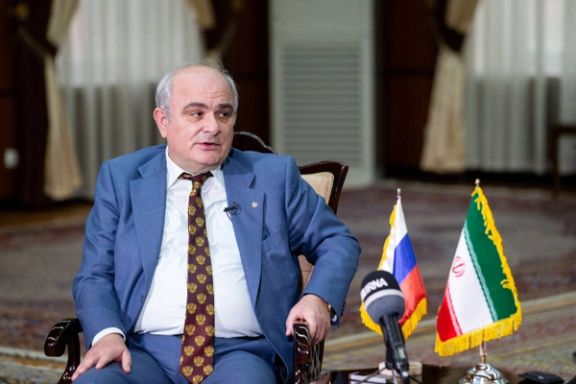
Many Iranians have a historical bias and distrust towards Russia for interferences in Iran's domestic affairs in Tsarist times, wars fought between the two countries, and later, the continuation of the same policies by the Soviets.
Despite the public’s prevalent negative view, an unprecedented host of high-ranking Iranian political and military officials attended the Russian national day ceremony at the embassy in Tehran on June 12 this year and lined up to shake hands with the controversial ambassador.
High-ranking officials traditionally keep away from most national day ceremonies at foreign missions in Tehran where alcohol is served, and women do not have to wear the hijab.
Dzhagaryan became famous among Iranian social media users in February when the Russian embassy posted a photo of him on Twitter laying a wreath at the foot of a monument to Alexander Griboyedov inside the embassy compound on Diplomats Day.
Social-media users expressed outrage because of Griboyedov’s role in a 1828 treaty, ending the Russo-Persian War (1826-1828) forcing Iran to cede the south Caucasus to the Russian Empire. Griboyedov was killed by a mob in Tehran in 1829 after being appointed Russia's ambassador.
Following Russia’s invasion of Ukraine, Dzhagaryan instructed Iranian reporters in Tehran on how to cover the event and not to use the word ‘war,’ instead to call it a ‘special military operation.’
The Russian ambassador also annoyed Iranian officials ahead of the Russian leader Vladimir Putin’s visit to Iran in July when he said in aninterview with Shargh newspaper that "hijab and the lack of alcoholic drinks in Iran prevent Russian tourists from coming to Iran.” This was seen as criticism of the Islamic Republic's underlying Islamic values.
Dzhagaryan also said Iran owed Russia hundreds of millions of euros and was not paying its debt.